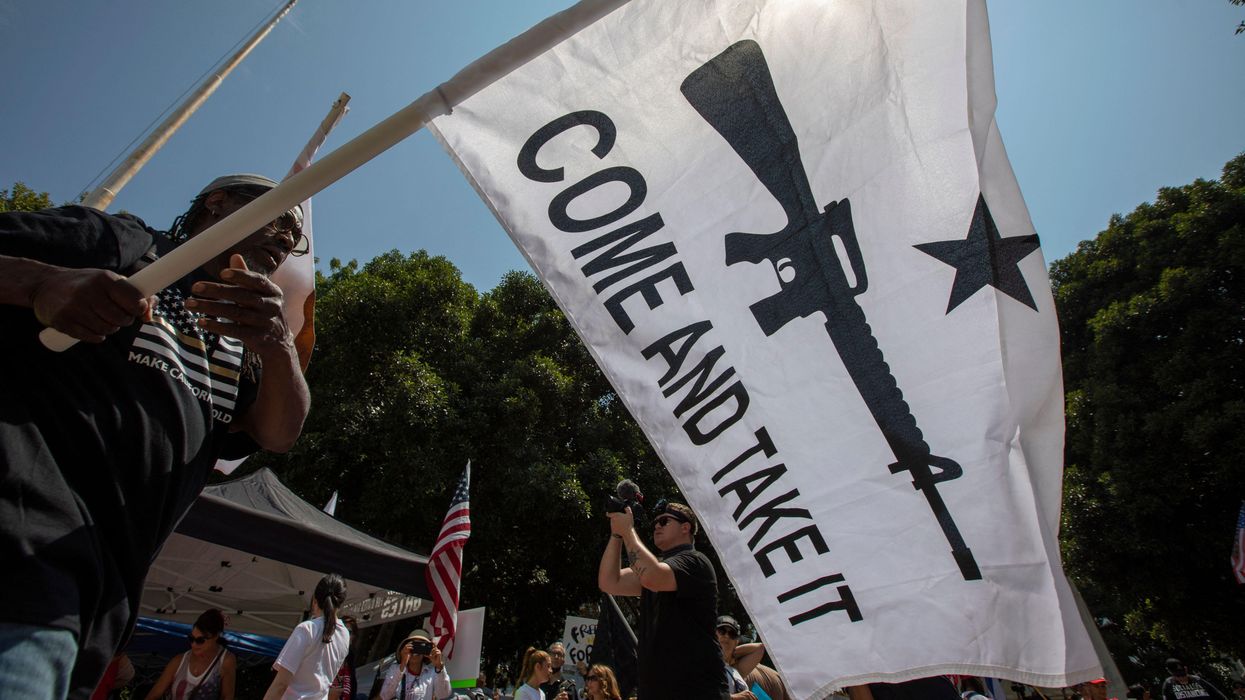Liu is CEO and co-founder of Citizen University.
Last week I was at Disneyland with my daughter. When you’re there, it’s like a dream — a time-distorting swirl of people and sound and color. But as in a dream, certain details lodge in waking memory. One that has stuck in my mind is a burly young white father, ambling outside Fantasyland, wearing a T-shirt with a silhouette of a semiautomatic rifle and the words "Come and take it." This was days after Buffalo, and days before Uvalde.
This was, in short, just another day in America. But the reason that man and his T-shirt and his child stuck with me is that he felt it was utterly normal to wear such a shirt. In a way, it was.
"Come and take it" is the slogan of gun-rights absolutists who think any effort to promote gun responsibility and safety is a tyrannical assault on their liberty that must be met with … assault rifles. It is defiant and petulant. It is threatening. And though it tries to project strength and bravado, it betrays deep weakness and sickness. In the guns debate, only one is armed to the teeth. Yet that side acts as if it is cornered, helpless, has nowhere else to turn.
Cornered, helpless, nowhere else to turn is how those students and teachers in Texas felt yesterday and those grocery shoppers in New York felt last week. Cornered, helpless, nowhere to turn is how so many of us today feel about the national epidemic of gun violence — about the diseased state of our norms, the comatose state of our democratic institutions.
But we are not in fact helpless.
This morning I met with a group of high school students from the West Side and South Side of Chicago. Black and brown, from neighborhoods that lack grocery stores, well-paved streets, youth development programs, job opportunities. They have reason to be as angry and defiant and petulant as that Disneyland man. They have reason to be cynical about how much attention gets paid to mass shootings and school shootings when 19 shot to death is a routine, overlooked two-week tally in Chicago.
They were, instead, compassionate and purposeful. They felt for the families and neighbors of Buffalo and Uvalde even as they feel for their own families and neighbors. They want more voice, in their school and in their city. They are learning to organize and advocate. They spoke of the need for better laws on guns and better policies on mental health. They spoke as much of the need for better norms. The world does not expect or allow them to be full human beings with deep potential and wide interests. Still, they keep pushing to be their full selves. They feel most powerful, they said, when they are keeping the peace, standing up for others, calling out injustice, organizing protest, figuring out who decides things and making them listen. They are redefining what it means to be age 17 on the West Side — what people expect of you and what you expect of yourself.
None of us is powerless right now because all of us can change the culture of our community. That man in the "Come and take it" T-shirt is doing his best to change the culture, to shift the boundaries of what is normal and OK in public life.
We can do as those Chicago Public School students do, and commit to setting a different kind of example. We can learn from Sari Kaufman, a member of CU’s Civic Collaboratory and one of the survivors of the 2018 Parkland gun massacre: she didn’t just become a leader of the March for Our Lives movement; she created a project called MyVote to connect young people to local elections because she learned the hard way that change in this country comes from the local outward and the bottom up.
It is hard, when we are flooded by grief and numbed by death, to exercise civic imagination. But this is when we need it most. There is a different society to be had. One in which a teenager like the Texas shooter, a kid with a lisp and a stutter, isn’t bullied and shunned, doesn’t withdraw, doesn’t have easier access to firearms than to friends or counselors or opportunities to thrive. One in which gun owners, the day after, the minute after a massacre, do not harden their hearts and double down on talking points about "politicizing" guns but instead imagine what it’d be like to be there and then become the champions of responsible reforms. One in which people young and old recognize that the more we dehumanize each other the more we will kill each other and live in fear of being killed. One in which we are a strong people, able to integrate power and character, who don’t wait for strong leaders but in fact lead our leaders.
That is the society that every person I work with is trying to create. That is the culture we at Citizen University are trying to foster. It is what is in your power to make, at every scale from neighborhood to nation.
Come and build it.
This article was first published by Citizen University.



















Trump & Hegseth gave Mark Kelly a huge 2028 gift